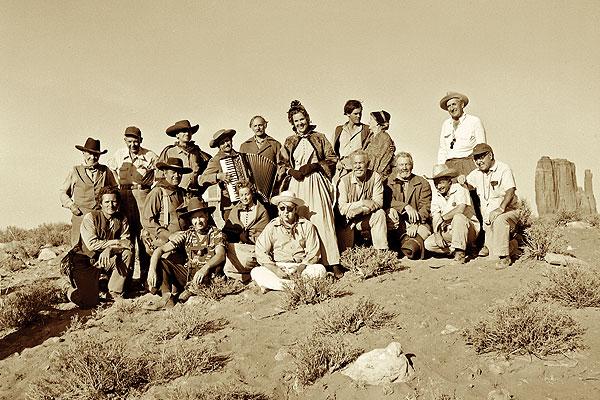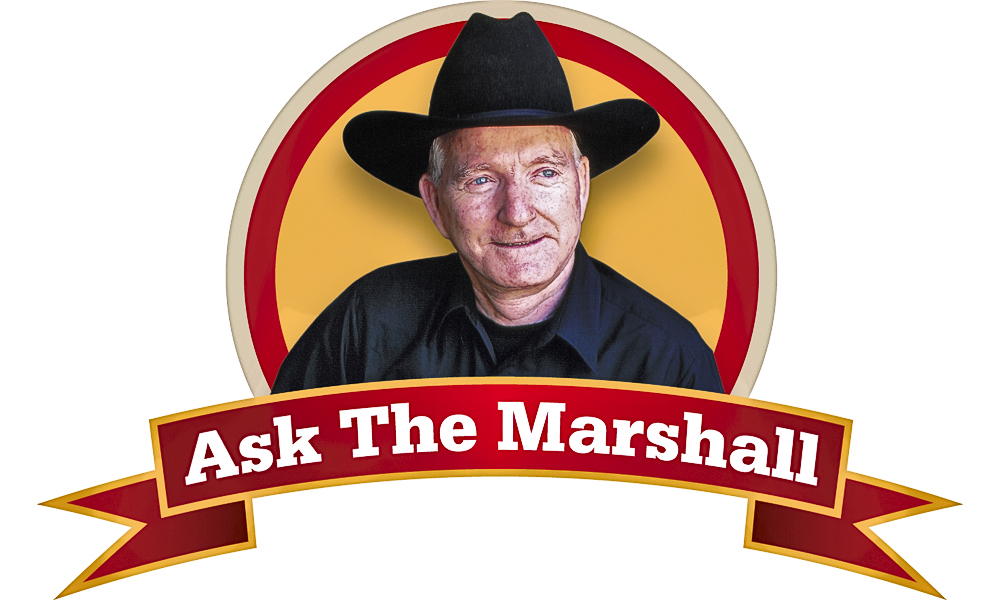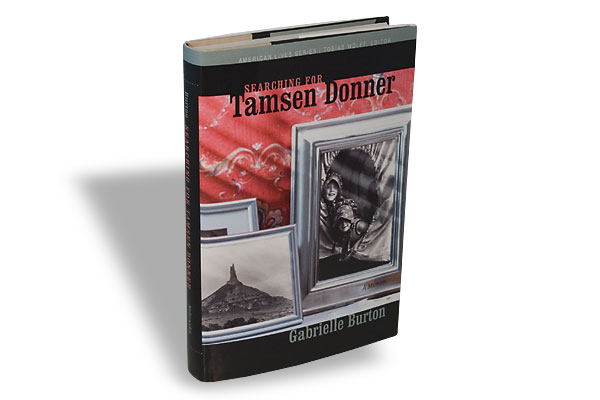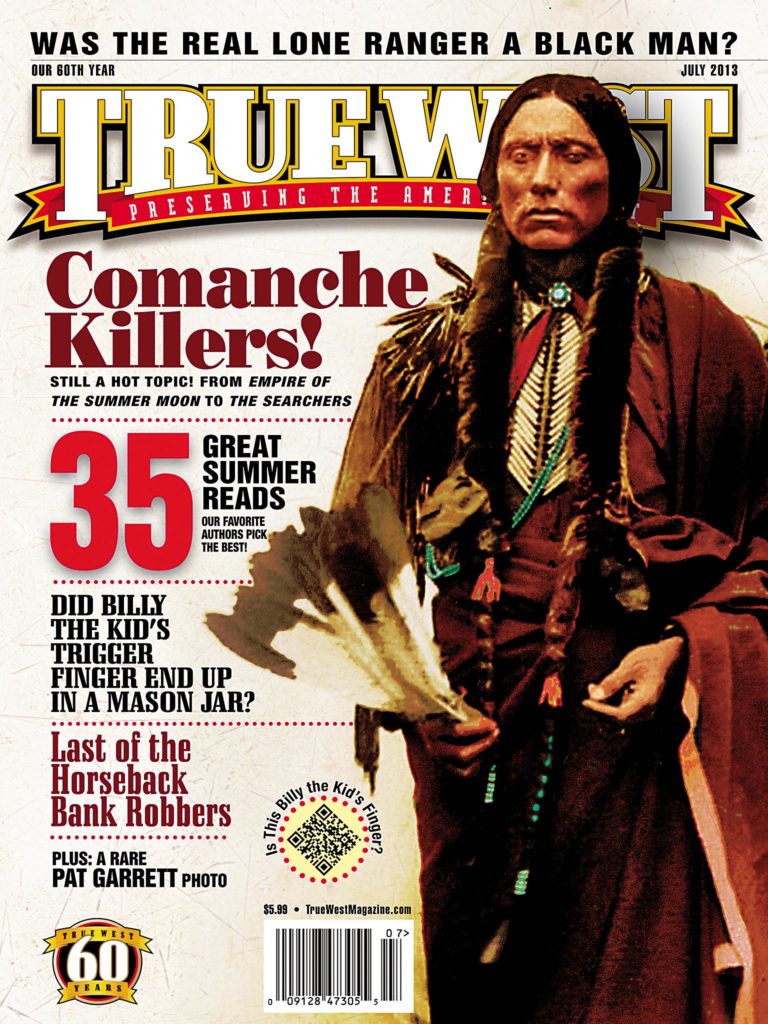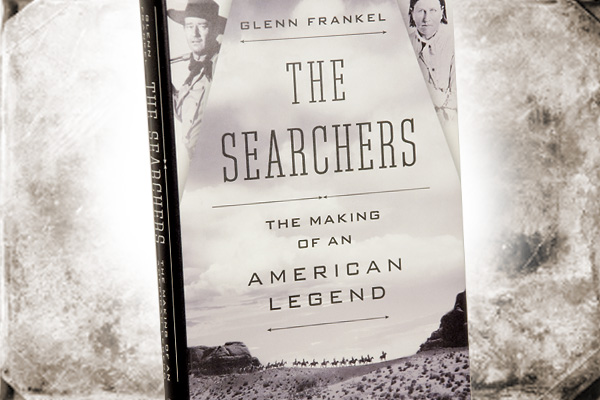 In Martin Scorsese’s Mean Streets, Robert DeNiro and his buddies steal some cash and use it to see The Searchers. To some, Scorsese’s tribute to an old John Ford/John Wayne Western must have felt wildly out of place in the middle of a scorching New York street flick.
In Martin Scorsese’s Mean Streets, Robert DeNiro and his buddies steal some cash and use it to see The Searchers. To some, Scorsese’s tribute to an old John Ford/John Wayne Western must have felt wildly out of place in the middle of a scorching New York street flick.
Author Glenn Frankel would not agree.
Like Scorsese, the Pulitzer Prize-winning journalist experienced a signature moment when a work of art touches so deeply, it stays with you forever. “I’m not even sure how old I was when I first saw The Searchers, but it was on TV, and it really affected me. I didn’t see it again until I was in college, and it had such a big impact; it’s such a powerful and unsettling movie. There’s so much going on, and I always kept coming back to it.”
During his time as a visiting professor at Stanford University, Frankel decided “to write an American book. It was the 50th anniversary of the film, and nobody was paying much attention. I started looking into the background of the film and discovered it was loosely based on a true story.”
The former Washington Post Sunday magazine editor admits to being unaware of the 1836 kidnapping of nine-year-old Cynthia Ann Parker by the Comanche, and how that event inspired Alan Le May’s novel. “If you’re raised in Texas, you get Cynthia Ann Parker in your school curriculum, but if you’re raised in Rochester, New York? You don’t. What you get is the chance to watch The Searchers.”
The special edition DVD of the film, and its documentary A Turning of the Earth, spurred Frankel’s research: “Director John Milius talked about Parker, and I looked up some things, and suddenly that opened a whole new world for me. What began as a ‘making of the movie’ book quickly took on another, and deeper, level to explore.”
Frankel became fascinated with the history of Cynthia, who lived with the Comanche for 24 years and was the mother of their chief, Quanah Parker, and how Le May transposed those events for his novel.
Le May had substantial credits as a screenwriter before he turned his attention to the Parker story, having toiled for Cecil B. DeMille on a number of projects, including Reap the Wild Wind, costarring Wayne. “I really wanted to find out about Le May, because he’s the crucial link between the story and the film. He’s one of those classic Hollywood figures, who starts as a novelist, comes out to Hollywood to make money, gets frustrated and finds his way back to writing this novel. The book was very well received at its time, but it’s a grim, relentless story. Le May was a Western guy. He knew about horses, about weaponry. He knew history.”
When The Searchers was published, Ford’s partner, Merian C. Cooper, bought the rights. Ford had always been interested in the Parker story, and Cooper knew this would fit his sensibilities perfectly. Cooper is usually remembered today as the producer of King Kong, but he had a highly honored military career, as well as being a prolific producer, documentarian and the prime mover behind the Cinerama process. Actor Harry Carey Jr. said, “Colonel Cooper was one man that Ford respected totally.”
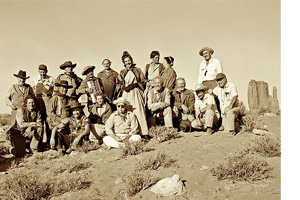
John Wayne, Jeffrey Hunter, Danny Borzage—who played accordion on Ford’s film sets for four decades— and more of the cast and crew of The Searchers gather around director John Ford on set in Monument Valley.
— By Allen C. Reed —
But even that respect didn’t guarantee clear sailing with the director. Frankel found that out when he researched the partnership that had already yielded Fort Apache and The Quiet Man. “Cooper rescued Ford a number of times, in the 1930s, when Ford was known as a mean drunk, who wasn’t getting stuff done,” Frankel says. “Later on, he rescued him with The Searchers, when he needed this movie. They were very different personalities. Anyone close to Ford took a fair amount of abuse, but I don’t think he did that as much with Cooper, because his admiration was so intense.”
Frankel discovered several surprises while looking into the film’s shoot. “They were only in Monument Valley about five weeks, and I thought they were there for months. Of course, half the movie was made at the studio, and you can sure tell the difference,” he says, with a laugh.
“But Ford wrote practically nothing down, so that was very frustrating, because there are so few notes and records,” Frankel admits. “He cut in the camera, so there are very few outtakes. When you see the Warner Bros. Presents TV show, and Jeff Hunter comes on with nine canisters of film and says that Ford allowed behind-the-scenes footage to be shot for the first time. Well, you get to see about 10 minutes worth, but where’s the rest? People look for this stuff and can’t find it.”
Searchers star Vera Miles declines interviews about her great career, but Frankel spoke to a number of other cast members, including actress Pippa Scott. “She actually found Ford nurturing, although there were other things going on, the way he was with other people, that scared the hell out of her! But he was good with young people,” Frankel says.
At the center of Ford’s masterwork is Wayne, who brought an amazing intensity to his performance as Ethan. This is rightfully considered one of the actor’s finest films, and it was his personal favorite. One of the changes made from Le May’s book was the name of Wayne’s character, which was originally Amos.
“If you want to see what John Ford was thinking, compare the final shooting script by [Frank] Nugent to what’s actually in the film,” Frankel says. “You can see the choices that Ford made, eliminating exposition and dialogue, leaving things more ambiguous, which is why I think it’s such a great movie.”
A great movie that did decent business, but wasn’t seen as special at the time: “Ford moved on. I’m sure he was disappointed about the film not doing better, but he wouldn’t own up to it. Wayne was disappointed, and he said so. He thought it was promoted as another John Wayne movie.”
How did the film resurrect itself, so many years later, to be regarded as an American classic? “These directors, like Scorsese, saw the film at a formative time, and it influenced them,” Frankel says. “It’s quite accurate when Hemingway said, ‘All modern American literature comes from one book by Mark Twain called Huckleberry Finn.’ Well, all modern Hollywood films by [Steven] Spielberg and these people stem from The Searchers in one way or another. It’s the movie they have in common, the one they all talk about.”
{jathumbnail off images=”images/stories/Jul-2013/Jul-13_images-for-stories/cast_film_The-Searchers-small.jpg”}
Photo Gallery
–— By Allen C. Reed —


